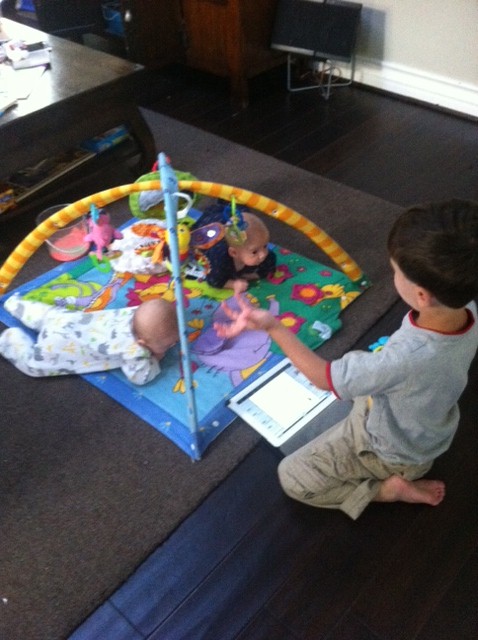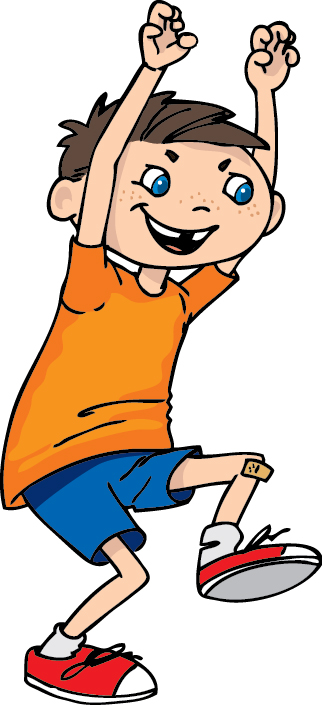Are you ready to rock and roll? See what the experts (and the kids!) have to say about getting your kids involved in music. This is an article written by John Crossingham. It was originally published in Today’s Parent March 2012. Here is the link and I have copied the article for your review below. I have observed my grandchildren – for whom I wrote the music and stories in RockinGrandmaMusic. Along with listening to classical music every day -10-12 different composers from Bach and Mozart, to Franck and Handel -Jack’s comprehension and vocabulary has exploded. He reads fluently – books level 1 and 2 – and is four years old. He is self taught – no one sat and drilled him – and he and his brother Jonah are also learning Chinese ( which they love) and by living in California are naturally learning Spanish. Music, language skills and love – what a great combination! Here Jack is teaching his twin brothers Noah and Gabriel (10 weeks old) about Gershwin!
Most parents can agree that kids just get music, instinctively and instantly. We recognize it the first moment we successfully calm a hysterical newborn with a ballad or watch a toddler, who can barely stand, boogie to the rhythm of a song. But what else is going on in their little brains when the baby dance-a-thon in the kitchen is going strong?
A lot, it turns out. Recent studies have shown that interacting with music – as opposed to just listening to it – has the power to improve your rugrats’ abilities to understand language, do math and much more.
Recently, E. Glenn Schellenberg from the University of Toronto has shown that music lessons can boost a child’s IQ, while Krista L. Hyde from McGill University in Montreal has demonstrated how lessons can change a brain’s actual structure – even suggesting they could help children with developmental disorders. More and more, music appears to be an all-in-one workout machine in the weight room of your kid’s brain.
Now, for some, this music-as-brain-superfood thing seems like déjà vu. Remember the Mozart effect, the ’90s fad that led a generation of parents to believe that playing classical music for their children could turn them into geniuses?
“Listening will do nothing for the brain,” says Sylvain Moreno, the world-renowned neuroscientist and leading researcher at Baycrest, a cognitive neuroscience and memory research centre affiliated with the University of Toronto. “You have to be in a kind of interaction with music.”
The award-winning Moreno’s on going research into how music affects a child’s cognitive skills has so far come to one overwhelming conclusion: When children engage with music — actively play or study — their cognitive skills are strengthened.
Are you ready to rock and roll?
Cognitive skills are used every day to absorb and process information — they’re our powers of memory and concentration. Are we born with them? Sure, all of us arrive with a few distinct talents, but like our body’s muscles, there’s nothing that can’t be bulked up — or, in this case, tuned up.
“Before any season in sport, there’s a training camp,” explains Moreno, “and if the athletes don’t have the training camp, they will not perform as well. It’s the same kind of idea. Music is able to improve activities in the brain.” (Grandma’s note: Here is our little Pretend Family boy, Lolly, who dances every day to ‘Dancing in my Room’. Dancing in My Room Sample)
While these athletic analogies can make this all sound suspiciously like an unwanted New Year’s resolution, Moreno’s approach is not only unorthodox, it’s also fun and fast. Instead of instruments and lessons, his team used a far more appealing vehicle: the computer game. ( Grandma’s note: This is great – but putting on music and having the kids learn the words, dance to the beat and interact with you and the music is a great way to get similar results – if you want to avoid a computer game!)
Called SmarterKids Training, these custom-made games introduce children to basic principles of pitch, rhythm and melody — everything from recognizing the sound of a note to identifying where it goes on a staff. Given that the kids in the study only played these games for about two hours a day for four weeks, the goal wasn’t to provide an ability to perform music. Instead, children got a chance to let their minds steep in the language and structures of music.
The effect was quick. Verbal IQ scores in the children who participated were consistently higher than before — more than 90 percent of the kids showed improvement. What’s more, a group of children who followed a regimen of games focused on visual arts concepts, such as colours and shapes, didn’t improve as much. While Moreno concedes that his studies are far from finished (and also acknowledges that the world doesn’t exactly need more computer games), there are some exciting things about where his research is pointing. For one, the notion that music can improve something as seemingly unrelated as language skills suggests remarkable things about our kids’ brains. Second, unlike the music lessons referenced by folks like Schellenberg and Hyde, games like this could potentially bring these cognitive benefits to a wider audience — kids whose parents can’t afford lessons, or for kids who don’t like them.






As a Grandmother, I find this article most interesting and will share it with the kids. I remember when my daughter was in my womb, I would play “Rossini” over and over again. When she was a week old, I played it and she turned her head instinctively …. She knew it! I found that amazing.
When she was a baby, I did everything with her and sang to her all the time while doing my chores. I would make up little songs like “mommy is cooking an egg” etc. She would look at me and kick her legs.
I find that music is the best way of learning things. Did you ever have a little song in your head you couldn’t get rid of? That is what I mean.
Again, Thanks for this article, I’ll teach my kids from it.
Donna Merrill
Donna thank you so much how lovely of you!